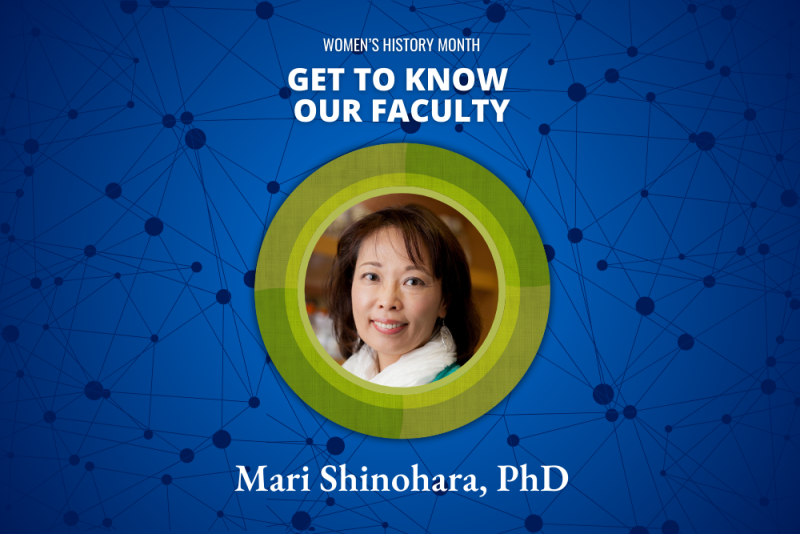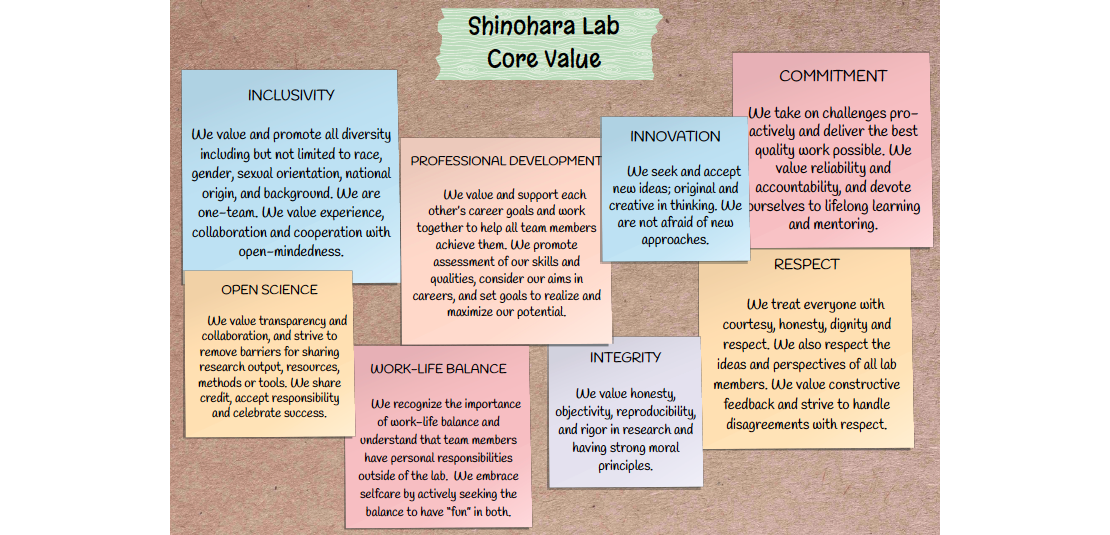
Mari Shinohara, PhD, started her laboratory at Duke University Department of Immunology in 2009. She is a Professor of Integrative Immunobiology, Molecular Genetics and Microbiology, Cell Biology, and Neurobiology. She is also a Faculty Network of the Duke Institute for Brain Sciences. Mari is the Director of Graduate Studies in Immunology.
Dr. Shinohara obtained her bachelor’s degree in enzymology (Drs. Keitaro Hiromi/Ben Tonomura at Kyoto University, Japan) and PhD in fungal molecular evolution (Dr. Scott Rogers at State University of New York – ESF, Syracuse). She did her first Postdoc on circadian rhythm using a fungal model (Dr. Jay Dunlap at Dartmouth Medical School) and the second Postdoc on T cells and dendritic cells in autoimmunity (Dr. Harvey Cantor at Dana-Ferber Cancer Institute/Harvard Medical School).
Briefly describe your upbringing, where you are from, where you went to school.
I hail from the vibrant Osaka/Kyoto region in Japan, where I spent my formative years. Growing up in this dynamic area instilled in me a strong connection to both urban life and rich cultural heritage. Interestingly, I'm trilingual, speaking English, Standard Japanese, and the distinctive Osaka dialect!
My educational journey took shape within the framework of the public school system, and I got a bachelor’s degree from Kyoto University. But before diving headfirst into graduate school, I embarked on a wildly fun 5-year stint as a brewing chemist at Suntory (yes, the whisky people do beer as well!), building upon the knowledge I gained during my internship at the Carlsberg Research Laboratory for brewing in Denmark. In Suntory, I spent my days researching hop bitterness compounds and yeasts in beer. I cannot forget another important job description on a daily basis - tasting beers, whiskies and wines.
Oh, and did I mention I'm a bit of a trailblazer in my family? I'm the first to venture out of the country, pursuing advanced education and a career in science. Basically, I'm the scientific black sheep of the family... in a good way!
What inspired you to pursue a career in science and academia?
My fascination with science and academia stems from the intoxicating blend of intellectual freedom and the thrill of discovery. There's something undeniably exhilarating about uncovering new knowledge, things even the internet might not know yet! And let's not forget the joy of mentoring future scientists.
How do you see your research contributing to the department and the broader scientific community?
I hope research in my lab connect various subfields of immunology: neuroimmunology, anti-fungal immunity, innate immunity, and more.
Can you discuss any recent publications or projects you're particularly proud of?
Let me focus on representative publications of last few years by my proud lab alumni.
- Shengjie Xu's (2020) research in Science Immunology revealed how alveolar macrophages (AMs) morph into two distinct AM subpopulations during fungal infections. This discovery sheds light on the crucial roles these cell subpopulations play in maintaining a delicate balance between pro- and anti-inflammatory responses.
- Elizabeth Deerhake's (2021) findings in Immunity challenged conventional wisdom about Dectin-1, a C-type lectin receptor. Using a mouse model of multiple sclerosis (MS), her work demonstrated that Dectin-1, a receptor known to trigger inflammation to fight against fungal infections, actually acts to dampen neuroinflammation.
- Nupur Aggarwal's (2021) study in Cell Reports brought much-needed clarity to the role of osteopontin (OPN) in acute graft-versus-host disease (aGvHD). By elucidating the mechanism by which OPN secreted by CD4+ T cells exacerbates the disease in the gut, Nupur's work paves the way for developing targeted therapies to combat this devastating condition.
- Will Barclay's (2022) study in JCI Insights exemplifies the spirit of scientific discovery. While investigating the role of inflammasomes in a mouse model of MS, Will unexpectedly found that the AIM2 inflammasome, not the anticipated NLRP3 inflammasome, is activated in astrocytes, not in microglia and myeloid cells recruited to the central nervous system. (Note: This finding was in vivo, not tissue culture setting.) This surprising finding highlights the importance of exploration and underscores that exiting findings often lie beyond initial expectations.
This is just a taste of the research happening in my lab. Stay tuned for more discoveries coming your way!
How do you balance your work and home life?
I subscribe to the "work hard, play hard" philosophy.
The "play hard" part involves multiple passions. First, there's my deep love for Latin beats (Particularly Brazilian ones). Over a decade ago, I channeled this love into Zumba, going from student to instructor. However, my "real job" keeps me hopping, so I've had to hang up my Zumba hat for now.

Secondly, I find my Zen through various crafts with occasional distraction from my two dogs, Nico and Yuki. Many of my accessories are proudly self-made, which is both therapeutic and a great way to avoid impulse purchases!
Finally, to keep myself centered amidst the work-life whirl, I practice mindfulness. It helps me stay present, focused, and maybe even avoid any salsa-related dance floor mishaps in the future.
Can you share any experiences or challenges you've faced as a female scientist in academia?
Being one of the few female scientists from Japan comes with the perk that people generally tend to remember me well. However, as a female scientist, I sometimes felt I wasn't taken as seriously particularly during my early years as a junior faculty member. — Okay, I should feel good about getting old.
How do you foster an inclusive and supportive environment for your lab members or students?
We established lab core values!

Any other information (personal or work-related) that you’d like to share?
From Beer Brewer to Enzyme Wrangler: A Circuitous Route to Academic Immunologist
Despite being a bit of a pioneer in my family, confidence wasn't exactly my middle name. So, fresh out of my first postdoc and riddled with Imposter Syndrome, I was afraid to pursue basic research. So I took a detour to a fantastic industry gig—for the second time. This time was at Novo Nordisk. There, I embarked on the thrilling quest of finding heat-stable enzymes in archaea and thermostable bacteria, then using fungi to, well, make even more enzymes! Fun stuff, great people and experiences. Novo Nordisk, as the first company that started producing insulin for Type-1 diabetes patients, also opened the door to immunology. Then, academia kept calling my name.
Now, I'm proud to boast a unique career path that's seen me navigate the worlds of both beer and biotech. Looking back, however, I realize I spent a good chunk of time finding my footing. So, here's my advice to young minds: If you know what you want, chase it down like a hungry yeast cell chases sugar!